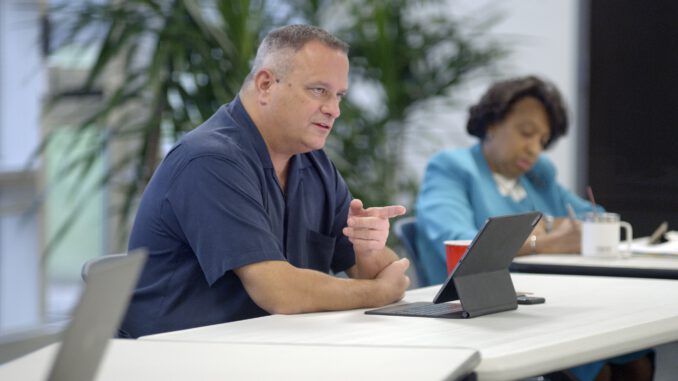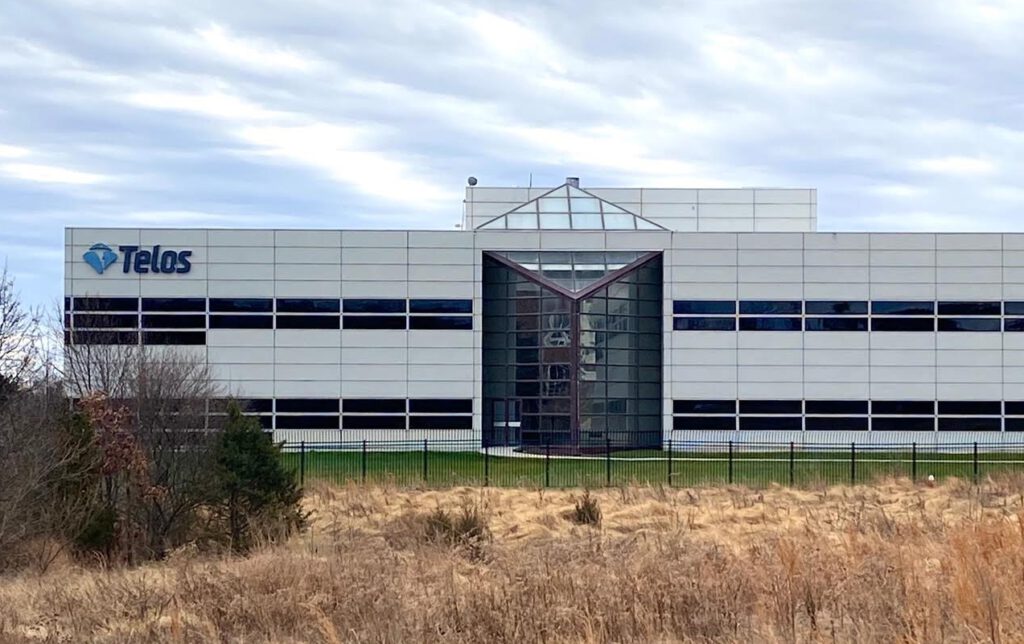
PASSWORD-PROTECTED
By Chris Wadsworth
The unassuming office building sits on an out-of-the-way corner in Ashburn, just off busy Route 7 but barely visible from the road due to bushes and trees. Its façade is a grid of white panels striped with dark glass windows. Behind those windows a war is being fought — one that every Ashburn resident and every American has a stake in.
The facility is the world headquarters of Telos, a leading cybersecurity firm whose clients include the departments of State, Defense and Homeland Security, as well as commercial customers such as Salesforce, Amazon Web Services, FedEx and Verizon.
John Wood is Telos’ CEO, chairman and president, and he has been running the company for nearly 30 years. Before his tenure, Telos had its hands in several different pies — software maintenance, hardware maintenance, even a computer equipment business. It wasn’t going well, and the company was facing a Chapter 11 bankruptcy filing. Wood, who had been an advisor and investor, came on board in 1992 and became CEO in 1994. He offered up a dose of bitter medicine.
“My suggestion was we sell everything and start over again,” Wood recalled. “So, we went from roughly 2,000 employees down to approximately 30 and then rebuilt the company totally focused on cybersecurity.”
And that’s what they did — creating a multimillion-dollar company with some 300 employees here in Northern Virginia and hundreds more at other Telos facilities around the country. The continued growth of the company led its leaders to take the company public in November 2020.
“It was a very weird time to go public,” Wood said. “We didn’t meet one banker or lawyer or accountant in person. It was all done over Zoom, which is a very unusual way to go public.”
Ashburn Magazine spoke with Wood about Telos — where it came from, the biggest challenges facing its industry and where it goes next. Here are excerpts from our conversation.
Q: If you were attending a cocktail party in Ashburn and someone who was unfamiliar with Telos asked what your company does, how would you explain it?
“In its most simple form, we use automation to make people and organizations more secure.”
Q: When you say you use automation, what is that?
“Just like on your iPhone, you have apps. We have our own apps, and apps all use automation. You may have to type in a few things, like your username and password … but after that the application takes over and guides you through. That’s what we are all about — making sure that we are protecting organizations, protecting people. And then we want to make sure we can find the people who are doing the bad things.”
Q: Who are you protecting your clients from? Who might be doing bad things?
“Most of my customers currently are large entities. Most are government or commercial entities, so we are protecting them from nation-states. We are protecting them from competitors. We are protecting them from ransomware. We are protecting them from pirating.”
Q: It seems everyone you talk to in Ashburn is somehow involved in cybersecurity. What factors are driving the growth of this industry?
“It has grown dramatically. When I was in school, I went to Georgetown where I worked in the academic computer center. I had access to this thing called an AS/400 computer. At the time, it was a half-million-dollar device. It weighed about three-quarters of a ton, and it had 100 megabytes of storage. The amount of people who had access to that computer was only a handful. Today, the iPhone has like 25 times the computing power. It has an exponential amount of storage capacity. And it’s got connectivity that people never had before. The number of people with access to [this kind of computer] power around the world has gone up exponentially.”
Q: I assume this is raising the risks we face.
“It’s almost a panic for me. In 1999, the Chinese government made a decision that they couldn’t beat us militarily or financially. So, they decided to dictate – that’s an important word – that their students become cyber warriors. This past year, the cyber warrior program in China graduated 2 million cyber warriors. When you compare that to the United States, we have a hard time mustering 100,000 kids just taking the AP computer science exam.”
Q: We’re getting outgunned from a manpower standpoint.
“It’s a huge frustration. The reason [Telos] went to automation so early on is that I felt that we would never have the firepower from the standpoint of human intervention to be able to deal with threats around the world, and unfortunately that’s bearing fruit.”
Q: How do you explain the threat of cyber-crime or cyber-attacks to the average Ashburn resident? For people not involved in the cyber world, it sometimes seems far removed from our daily life.
“We finally have an easy way of describing it. We thought, ‘Oh the Target hack — everyone will understand.’ Nope. [Editor’s note: That 2013 data breach affected roughly 41 million consumers.] The OPM attack? Nope — no one cared. [2014 data breach affecting 22 million records at the Office of Personnel Management.] But then came Colonial Pipeline. People cared. Why? They didn’t think they could get gas. It had a direct physical impact. There was a line of cars in Ashburn 40 cars long. It reminded me of the late ’70s, when they had the gas shortages. That was the first time when people realized, ‘Oh wow, this stuff can affect me directly.’”
Q: Telos was founded in 1969 in Santa Monica, Calif. When did it move to Ashburn?
“We moved to Ashburn in the mid-1990s. I remember — if you came down Route 28 to Route 7, and then you shot out towards Leesburg, you had GW (George Washington University) on the right side. You had our facility on the left side. Then you had the Lansdowne Resort and the National Conference Center and the FAA (Federal Aviation Administration). Everything else was farms.”
Q: Why was Ashburn chosen?
“When I took over, our business prospects had really fallen. I said we have to bid on stuff that will get us through, so we can build the capabilities that we want to build. And we won the largest server contract — at the time — in the history of the government. At the time, we were based in Herndon. It was actually what’s called a ‘single award,’ which in the government world is an unusual thing. When the government customer came out to our facility in Herndon, they said, ‘We’re not going to give you the contract. Your facility is way too small. We’ll give you 60 days to find a new facility.’ So, my team ran around looking for new facilities. This facility happened to be owned previously by Magnavox, and we negotiated a long-term lease and that’s how we got here.”
Q: Magnavox, like the maker of television sets?
“They make TVs, but they were also making very secure communication vehicles and that’s what this facility was used for previously.”
Q: What does the future hold for Telos? What does the company look like in 10 years?
“We have an aspirational growth target of a billion dollars [in annual revenue]. We think we can get there. Our offerings are in high demand, and they are driving a growth rate in excess of 35%-45% per year organically.”
Q: For comparison, what’s your company’s revenue currently?
“Last year, we did about $180 million, and this year, I think we gave guidance out to the market that we would do somewhere between $240 million and $260 million.”
Q: Last question — how do you keep track of your own passwords? Do you have a slip of paper in your wallet with them all written down?
“I have a 17-character alphanumeric with special characters password — that I change with relative frequency — that no one knows. That’s the password for everything I do.”

